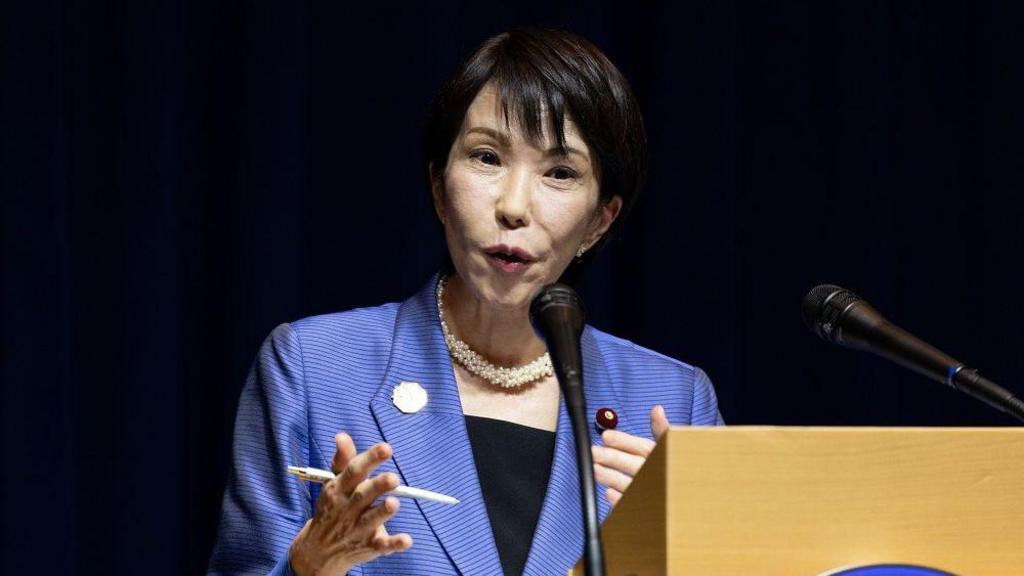Tensions between China and Japan have escalated into a heated exchange of words over the past week.
The dispute originated from comments made by Japan’s new Prime Minister, Sanae Takaichi, who suggested that Japan could deploy its self-defense forces if China were to attack Taiwan.
Since then, both nations’ foreign ministries have lodged formal protests, and a Chinese diplomat’s remarks have been interpreted by some as a threat against Takaichi.
The conflict highlights the historical animosity between China and Japan, as well as the long-standing “strategic ambiguity” surrounding Taiwan’s sovereignty.
Here’s a breakdown of the situation.
The immediate tensions arose during a parliamentary session in Japan last Friday, when an opposition lawmaker questioned Takaichi about what circumstances in Taiwan would constitute a survival-threatening situation for Japan.
Takaichi responded, “If there are battleships and the use of force, no matter how you think about it, it could constitute a survival-threatening situation.”
Under Japan’s 2015 security law, a “survival-threatening situation” is a legal term referring to an armed attack on its allies that poses an existential threat to Japan. In such cases, Japan’s self-defense forces are authorized to respond.
Beijing reacted strongly to Takaichi’s remarks, with China’s foreign ministry describing them as “egregious.”
On Saturday, Xue Jian, China’s consul general in Osaka, Japan, shared a news article about Takaichi’s parliamentary comments on X, adding his own comment that “the dirty head that sticks itself in must be cut off.”
Japan’s chief cabinet secretary, Minoru Kihara, told reporters on Monday that while the intent of Xue’s remarks “may not be clear,” they were “highly inappropriate.”
Tokyo has lodged protests with China over Xue’s remarks, while Beijing has lodged its own with Japan over Takaichi’s comments.
Although Xue’s post has since been removed, the diplomatic fallout continues.
On Tuesday, Takaichi declined to retract her remarks, defending them as “consistent with the government’s traditional position.” However, she noted that she would be more cautious about commenting on specific scenarios in the future.
The two countries have a long history of animosity, dating back to armed conflicts in the 19th century and Japan’s brutal military campaign in China during World War II.
Historical grievances have remained a point of contention in bilateral relations. The recent rise of Takaichi, a protégé of Shinzo Abe, suggests that further tensions may be on the horizon.
The conservative leader is seeking closer ties with the U.S. and has pledged to increase Japan’s defense spending, which has raised concerns in Beijing.
Takaichi is known for her hawkish stance on China and has long been a supporter of Taiwan.
She has previously stated that a blockade of Taiwan could threaten Japan, and that Japan could mobilize its troops to prevent a Chinese invasion.
China is particularly sensitive about Taiwan, the self-governed island that Beijing claims as part of its territory. China has not ruled out using force to take Taiwan, a position that has alarmed Taipei and its allies in the region.
Earlier this month, Beijing accused Takaichi of violating the one-China principle after she posted photos of herself meeting with a senior Taiwanese official on the sidelines of the APEC summit in South Korea.
The Japanese prime minister’s recent comments represent a shift from the ambiguous stance that the country has traditionally taken on Taiwan’s status.
This aligns with the U.S.’s long-standing policy of “strategic ambiguity,” which involves remaining vague about how it would defend Taiwan in the event of a Chinese invasion.
For decades, this ambiguity has kept China guessing, serving as a form of deterrence while allowing economic ties to flourish.
The Japanese government’s official position is that it hopes the Taiwan issue can be resolved peacefully through dialogue, and Japanese officials have generally avoided mentioning Taiwan in public security discussions.
When they have, they have faced strong criticism from Beijing.
In 2021, when then-deputy prime minister Taro Aso said that Japan would need to defend Taiwan alongside the U.S. in the event of an invasion, Beijing condemned his remarks and told Japan to “correct its mistakes.”
In this recent escalation, China’s foreign ministry said that Takaichi’s remarks were “a gross interference in China’s internal affairs.”
“Taiwan is China’s Taiwan,” ministry spokesperson Lin Jian stated at a press briefing on Monday, adding that China would not “tolerate any foreign interference” on the matter.
“What signal is the Japanese leader trying to send to ‘Taiwan independence’ separatist forces?” he added. “Is Japan up to challenge China’s core interests and stop its reunification?”
Manchester will host the Hyper Japan festival for the first time this week.
Prof Nick Megoran says the picnic on Aka island is as remarkable as the 1914 Christmas Day truce.
The Japan exhibition at Keighley’s Cliffe Castle Museum features work from Hokusai and Hiroshige.
Police have reclassified Iris Hsieh’s “sudden death” as murder and remanded Namewee in custody.
The franchise is the inspiration for many other superhero shows that have aired in Asia.

